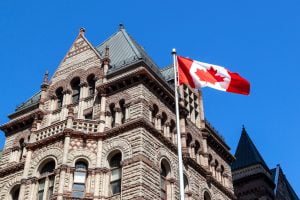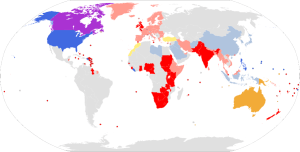The English language is spoken on every continent by around 1.5 billion people (as of 2023). As with other widespread languages like Spanish, however, English does not look or sound the same in all areas. In this article, we outline the four major regional variants of English and explore how their spelling, vocabulary and grammar differ.
British English

The English language originated in the British Isles, and because the British Empire, and later the Commonwealth, covered such a large area of the globe, British English is the basis for numerous other varieties of English. The group of English variants that share the most features with British English is known as Commonwealth English – this encompasses many English variants from Commonwealth countries, including Australia, India, Malta, New Zealand, Nigeria, South Africa and Singapore. Most of Europe’s second-language speakers of English also tend to follow British conventions, likely due to the influence and geographical proximity of the United Kingdom and Ireland.
In contrast to American English, British English retains many spellings of words of Latin and Greek origin that are closer to those of French, through which many of these words entered the English language, due to Francophile tastes in Victorian Britain. These include words such as ‘programme’, ‘cheque’, ‘manoeuvre’ and ‘dialogue’, whose more etymologically consistent spellings (‘program’, ‘check’, ‘maneuver’ and ‘dialog’) that are closer to the original Latin or Greek were more popular in the United States and elsewhere.
American English


Due to the prevalence of American media and the importance of the United States on the world economic stage, American English is now the most influential form of English worldwide. Linguistically, however, it has many features that are distinct from most other varieties of English from outside North America. These include some simpler spellings compared to British English, which eliminate what were considered by some 20th-century American linguists to be inconsistencies, often by removing silent or doubled letters and replacing others with ones that more closely reflect modern pronunciation. American English also has many different grammatical and stylistic preferences compared to British English, such as the use of the Oxford (serial) comma or double instead of single quotation marks. The only major locale outside North America to predominantly follow American English conventions is Philippine English, as a result of the United States’s occupation of the Philippines in the late 19th and early 20th century. Non-native English speakers from other areas also follow American conventions, such as China, Indonesia, Japan and Saudi Arabia.
Canadian English


Canadian English is somewhat of an exception among the major English locales around the world, as it employs a mixture of conventions from both British and American English. This is mostly due to the co-existence of English and French, which has led to Canadian English retaining many British English spellings that came into English through Norman French, such as ‘centre’ and ‘colour’. Meanwhile, Canadian English shares the American versions of many Greek- and Latin-derived spellings, such as ‘minimize’, ‘pediatric’ and ‘estrogen’.
Australian English


In Australian English, both British and American spellings are used, depending on the word, and often interchangeably. Overall, most words use the British spelling (‘colour’, ‘organise’, ‘cheque’, etc.); however, there are also many words that use the American spelling, such as ‘analog’, ‘program’, etc. Additionally, Australian English has its own extensive and unique vocabulary that is either not used elsewhere or carries a different meaning.


| Key: | |
| British spellings analyse/centre/defence/labour/organise/programme dominant; English is an official or majority language. | |
  | American spellings analyze/center/defense/labor/organize/program dominant; English is an official or majority language. |
  | Canadian spellings analyze/centre/defence/labour/organize/program dominant; English is one of two official languages along with French. |
| Australian spellings analyse/centre/defence/labour/organise/program dominant; English is an official or majority language. | |
  | English is not an official language; British spellings dominant. |
  | English is not an official language; American spellings dominant. |
| Inconsistent use of British and American spellings. | |
  | No data |
| Notes: Data based on standard, official and/or taught usage. Actual usage may vary. Image author: Любослов Езыкин; based on: BlankMap-World.svg. Image used under licence CC BY‑SA 4.0. No changes made. | |
Spelling differences
Most of the differences between British and American English spellings stem from the desires of 19th-century American dictionary writers, such as Noah Webster, to reflect the simplest, most etymologically consistent spellings in common usage in the United States. In the United Kingdom, meanwhile, especially during the Victorian era, there was a preference for spellings closer to those of French – through which English acquired much of its Latin- and Greek-derived vocabulary – despite these not necessarily reflecting regular English spelling rules. Below are just some of the major differences between the four major English locales:
| British English | American English | Canadian English | Australian English |
| ‑ise, ‑yse, maximise, analyse | ‑ize, ‑yze maximize, analyze | ‑ize, ‑yze maximize, analyze | ‑ise, ‑yse, maximise, analyse |
| ‑our colour, flavour, behaviour | ‑or color, flavor, behavior | ‑our colour, flavour, behaviour | ‑our colour, flavour, behaviour |
| ‑re centre, fibre, metre | ‑er center, fiber, meter | ‑re centre, fibre, metre | ‑re centre, fibre, metre |
| ‑c‑ defence, licence (noun) | ‑s‑ defense, license (noun) | ‑c‑ defence, licence (noun) | ‑c‑ defence, licence (noun) |
| ‑ll‑ traveller, labelling, jewellery | ‑l‑ traveler, labeling, jewelry | ‑l‑ traveler, labeling, jewelry | Interchangeable. ‑l‑ is slightly more common. |
| ‑l‑ enrol, fulfilment (but enrolling, fulfilled) | ‑ll‑ enroll, fulfillment | ‑ll‑ enroll, fulfillment | Interchangeable. ‑ll‑ is slightly more common. |
| ‑mme programme | ‑m program | ‑m program | ‑m program |
| ‑gue, ‑que dialogue, cheque | ‑g, ‑ck dialog, check | ‑g, ‑que dialog, check | ‑g, ‑que dialog, cheque |
| ‑ae‑, ‑oe‑ anaemia, manoeuvre, haemorrhage, foetal | ‑e‑ anemia, maneuver, hemorrhage, fetal | ‑e‑ anemia, maneuver, hemorrhage, fetal | ‑ae‑, ‑oe‑, ‑e‑ (Varies depending on the word) |
Vocabulary differences
As well as spelling differences, there are many examples of entirely different words being used in different locales. These can be more likely to affect intelligibility than the spelling differences discussed above, as each locale’s unique vocabulary may well be very rare elsewhere or convey a different meaning or tone. Common examples include:
| British English | American English | Canadian English | Australian English |
| autumn | fall | fall | autumn |
| town/city centre | downtown | downtown | CBD (central business district) |
| fire station | fire house | firehall | fire station |
| toilet, WC, loo | bathroom or restroom | washroom | toilet, outhouse, dunny |
| maths | math | math | maths |
| anticlockwise | counterclockwise | counterclockwise | anticlockwise |
| orientate, orientated | orient, oriented | orient, oriented | orientate, orientated |
| expiry date | expiration date | expiry date or expiration date | expiration date |
| enquire, enquiry (inquire/inquiry only in a legal context) | inquire, inquiry (all contexts) | inquire, inquiry (all contexts) | enquire, enquiry (inquire/inquiry only in a legal context) |
| mobile phone | cell phone | cell phone or mobile | mobile |
| sweets | candy | candy | lollies |
| ice lolly | popsicle | popsicle | ice block or icy pole |
| (red/green…) pepper | bell pepper | bell pepper | capsicum |
| aubergine | eggplant | aubergine or eggplant | eggplant |
| courgette | zucchini | courgette or zucchini | zucchini |
| Wellington boots, wellies | rubber boots, galoshes | rubber boots, galoshes | gumboots |
| estate agent | realtor | realtor | real estate agent |
Grammatical differences
Most of the grammatical differences between British and American English are preferential, but it can nonetheless cause confusion if local conventions are not followed. These differences are often highly context-specific, but here are just a few examples:
- Some past participles have different forms:
British English: learnt, burnt, sneaked, dived
American English: learned, burned, snuck, dove
- American English often does not clearly differentiate between adjectives and adverbs, whereas British English does:
British English: the dog is quick, the dog ran quickly
American English: the dog is quick, the dog ran quick
- British English tends not to use the Oxford (serial) comma before ‘and’ or ‘or’ in lists, except for clarity; American English always uses it:
British English: one, two and three
American English: one, two, and three
- British English uses the en dash with spaces either side; American English uses the em dash with no spaces:
British English: the en-dash – strongly separating clauses
American English: the em-dash—strongly separating clauses
- British English typically uses single quotation marks; American English uses double quotation marks:
British English: ‘Good morning’
American English: “Good morning”
- In the case of British English quotations, the end punctuation is placed outside the closing quotation mark, unless it is part of the quote. In American English, it always goes inside the closing quotation mark:
British English: ‘Good morning’, she said.
American English: “Good morning,” she said.
If you are writing English-language content or having a text translated into English, our in-house English localisation experts can help you to ensure that the text follows the appropriate regional conventions for your target audience. Speak to one of the team today for more information or to get a quote.
Author: Joseph Smith, Junior Project Manager

